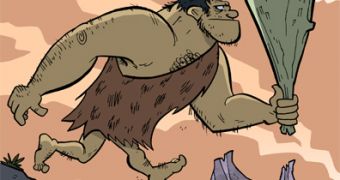If you're among those looking for a diet that could help you lower the risk of getting heart disease, something generically called "the caveman diet" is not likely to make you feel very confident any good could actually come out of it. However, it would seem that for the sake of our health, we should put appearances and prejudices to the side and have a look at what primitive eating habits could do for us.
First of all, what is a stone-age diet made up of? Naturally, we're talking about eating the various types of food that were available to men in those distant times, things such as vegetables, berries and nuts that primitive men could pick from trees or plants, and plenty of lean meat from the animals they could hunt.
Scientists say just three weeks on the diet are enough to mark a noticeable improvement on our health and lower the chances of suffering a stroke or heart-attack. Going on the stone age menu lowers blood pressure and helps lose weight, in addition to lowering the levels of blood-thickening agents that may create clots and lead to strokes.
The diet was tested on a group of 20 healthy volunteers by researchers at the Swedish Karolinska Institute, and the results of the study were published in the European Journal of Clinical Nutrition. The theory is that given how humans successfully survived for such a long time eating only meat, fish, vegetables, nuts and fruits, modern humans still have a genetic predisposition for this kind of diet.
The volunteers who took part in the test were given a list with things that they were allowed to eat and things they shouldn't touch at all costs. Fresh or frozen fruit, berries, vegetables, lean meat, unsalted fish, tomatoes, lemon juice, coffee or tea without milk or sugar were allowed, while the banned goodies included all dairy products, pasta, beans, rice, nothing containing alcohol, sugar and fruit juice. At the end of the test, measurements indicated that there had been an average weight loss of around five pounds. The volunteers' systolic blood pressure was also lowered, while levels of clotting agents in the blood dropped by no less than 72%.
"A short-term intervention with a paleolithic diet had some favorable effects on cardiovascular risk factors. But one negative effect was the decreased intake of calcium (from dairy goods), which could be a risk factor for osteoporosis later in life" admitted Dr Per Wandell, who was in charge of the study.

 14 DAY TRIAL //
14 DAY TRIAL //